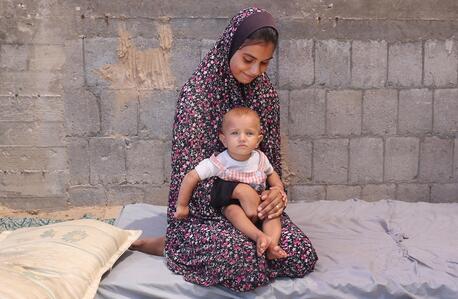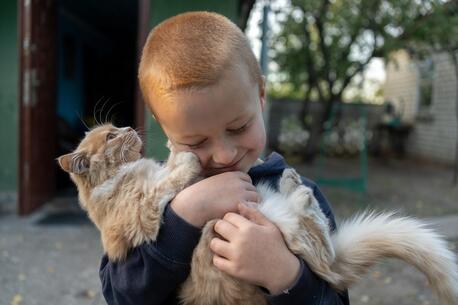
UNICEF Gets Supplies to Children and Families Inside Ukraine
Medicine, midwifery kits and other lifesaving supplies have reached Lviv and are being distributed to hospitals in five regions.
A six-truck convoy carrying 70 tons of emergency supplies shipped from UNICEF's Global Supply and Logistics Hub in Copenhagen has arrived in Lviv, western Ukraine. Items include:
- personal protective equipment to protect health workers from COVID-19
- medicine and first aid kits
- midwifery and obstetric kits
- surgical equipment and oxygen concentrators
- learning and recreational items for young children
Working with partners, UNICEF teams in Ukraine will be delivering medical supplies to 22 hospitals in five conflict-affected areas to benefit 20,000 children and mothers.
More supplies are on the way, including blankets and warm winter clothing from UNICEF's Turkey Country Office warehouse in Mersin.
Earlier today, a convoy carrying crucial medical supplies — including first aid kits, midwifery kits and surgical equipment — arrived in western #Ukraine. "It is lifesaving equipment that we will just continue to pour across this country," @UNICEF's @1james_elder tells @MSNBC. pic.twitter.com/3nKXPfEGbG
— UNICEF USA (@UNICEFUSA) March 6, 2022
UNICEF has been working around the clock to expedite emergency support to children and families devastated by the war — those who remain inside Ukraine and the 2.5 million refugees who have fled to neighboring countries as of March 11, with many more expected to follow.
Violence has intensified in and and around Ukraine's major urban centers, moving closer to the civilian population and claiming more and more lives. UN High Commissioner for Human Rights Spokesperson Liz Throssel said in a March 11 statement that the UN had recorded 549 civilian deaths and 957 injuries since the armed attack began on Feb. 24, "although the actual figure could be much higher."
Hundreds of homes have been damaged or destroyed and schools and health centers have sustained heavy damage. An attack on a maternity hospital in Mariupol on March 9 reportedly left young children and women in labor buried under rubble.
Families continue to shelter underground, in subways or in basements, cut off from basic services. With resources dwindling, hospitals are struggling to care for patients. Hundreds of thousands of people across Ukraine are without safe drinking water due to damage to water systems. Scarce medical supplies are crippling efforts to contain a polio outbreak.
Supplies desperately needed by women, children and health care workers inside Ukraine started arriving on March 5
"The situation for children and families inside Ukraine is increasingly desperate," said Murat Sahin, UNICEF Representative in Ukraine. "These supplies will help provide much needed support to women, children and health care workers."
In the meantime, Sahin added, UNICEF is preparing to scale up assistance in the hardest-hit areas as soon as humanitarian access opens up and security restrictions are eased. And as children and families flee across borders, UNICEF is opening 'Blue Dot' support centers where they can go to receive critical services and information.
UNICEF has decades of experience working in conflict zones to save and protect the most vulnerable and assisting those uprooted by conflict. Response teams are leveraging this boots-on-the-ground expertise along with UNICEF's massive supply operation and vast network of partners to maximize impact both inside and outside Ukraine. The response includes trucking safe water into conflict areas and prepositioning health and emergency education supplies for distribution as soon as possible. UNICEF is also supporting mobile teams providing child protection and psychosocial care to traumatized children.
"We have some 135 people working for UNICEF in Ukraine, and we are sending more to meet needs in-country," UNICEF Executive Director Catherine Russell reported to the UN Security Council on March 7. "The operating environment in Ukraine is extremely complex. Access constraints and rapidly changing front lines make it much more difficult to deliver critical supplies and services."
Russell reiterated UNICEF's call for an immediate suspension of hostilities in Ukraine, noting that a pause in fighting would allow more aid to get through and families to venture out to get food and water, seek medical care or leave their homes to find safety.
"We need a ceasefire and adequate guarantees to enable safe and rapid humanitarian access to all people in need across Ukraine," Russell said. "This brutality must come to an end."
Help UNICEF scale up relief operations in Ukraine. Your contribution can make a difference. Donate today.
TOP PHOTO: Murat Sahin, UNICEF's Representative in Ukraine, left, inspects emergency supplies as they arrive in Lviv on March 5, 2022. © UNICEF/UN0602211/Moskaliuk
HOW TO HELP
There are many ways to make a difference
War, famine, poverty, natural disasters — threats to the world's children keep coming. But UNICEF won't stop working to keep children healthy and safe.
UNICEF works in over 190 countries and territories — more places than any other children's organization. UNICEF has the world's largest humanitarian warehouse and, when disaster strikes, can get supplies almost anywhere within 72 hours. Constantly innovating, always advocating for a better world for children, UNICEF works to ensure that every child can grow up healthy, educated, protected and respected.
Would you like to help give all children the opportunity to reach their full potential? There are many ways to get involved.





